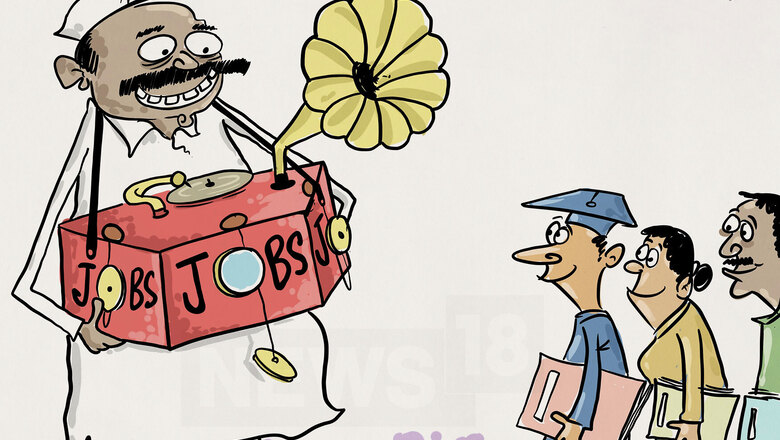
views
New Delhi: Hours after a National Sample Survey Office (NSSO)’s leaked report on the state of jobs in the country, which had been earlier withheld by the government, revealed that unemployment had reached a four decade-long high, the NITI Ayog claimed that the data was ‘not verified’ as the NSSO report was yet to be finalised.
At a hurriedly convened press conference, NITI Ayog Vice Chairman Rajiv Kumar attempted to downplay and dismiss the leaked NSSO report and said the numbers were not comparable to the unemployment data collected from 2010-11 as sample size and methodology of survey were different.
“I want to state categorically that the report is not finalised yet. It is just a draft report. The data cited (in news reports) is not yet finalised and approved by the government. Therefore, using it is not the right thing to do," Kumar told reporters. He added that the ‘leaked draft report was creating confusion’.
The reason why the NSSO report had not yet been put in public domain, Kumar said it was because the baseline data from July to September 2017 quarter could only be verified after being crosschecked with data from July to September 2018 quarter, which was not part of the NSSO report.
“The data from July to September 2018 has just been received and processed. Without that data, we cannot do a quarter on quarter comparison. We have to make sure the data collected in first round is verified by the data collected in subsequent quarter."
Kumar said neither did the NITI Aayog know the ‘Delta’ (the difference between data sets from two quarters) nor could it vouch for the veracity of the data. According to him, data from four quarters from 2017 and 2018 was included in the NSSO report and they needed to be crosschecked and verified with data from comparable last two quarters (till December 2018) which had just been received by the NITI Aayog.
The NITI Aayog Vice Chairman said that it was ‘wrong’ to compare present data on unemployment with data from 2010-11. “That was a quinquennial (done every five years) survey and the methodology was very different. It was divided on the basis of only two strata: affluent and poor. The present data is collected annually, quarter on quarter. It is based on educational qualification of households," Kumar said.
According to Kumar, It was incorrect to use the NSSO report as a final one to infer that unemployment is high as it must be verified with data collected in second round.
Kumar, along with the NITI Aayog CEO Amitabh Kant, then went on to cite various surveys and reports done by private firms and third parties like McKinsey, Ghosh and Ghosh and Society of Indian Automobile Manufacturers and said that data from those surveys suggest about 7.5 to 8 million jobs had been added to Indian economy. They, however, did not say if the data they had cited for their argument was verified or not.
“World Bank, IMF, UN, whatever report you take, they show Indian economy is growing at about 7 per cent. So where is that growth coming from if no jobs are being added?" Kumar questioned reporters. “There is a lot of evidence that jobs have been created in the last four years," he added.
Kumar said that the NSSO report, as widely reported, had not been suppressed by the government but merely withheld for verification purposes and the final data in unemployment in India would be available in public domain in March. The leaked data that appeared in a Business Standard report Thursday morning had not yet been approved, Kumar said. However, he deflected questions about the resignation of two independent National Statistical Commission (NSC) members over the delay in release of the NSSO data. “People resigning will have their own personal reasons, they have not contacted me, neither have I contacted them," Kumar said.
Reporters questioned Kumar and Kant over their claim that the data was yet to be approved and argued that the data was slated to release in December 2018. The NSC had already approved the release, so whose approval was required now. “I don’t know who else will approve it, I think the cabinet will," Kumar said.
Kumar also refused to comment on the report that cited leaked NSSO data, revealing that India was facing its worst jobs crisis in 45 years. “I can’t comment on Business Standard report because it has not been released by the government," he said. Kumar, however, had no objections when Kant went on to cite data that said Ola and Uber had added a total 2.2 million jobs in the transport sector in the past few years. When questioned that a large chunk of that data would overlap as several drivers are registered on both cab aggregator platforms, a flustered Kant said, “That must be only 15 per cent of total drivers." He did not, however, back his claim with any verified data.
The NITI Aayog CEO went on to say that the problem was not lack of jobs but the lack of good quality jobs. “There is a wages problem and there is large informal sector," Kant said. He added that there were jobs being created for new entrants, but the quality of those jobs was not high. Kant also said that attempts to formalise the informal jobs sector were underway. “It is unbelievable that no new jobs are being created," Kant at one point said.
Toward the end, Kumar and Kant stood up to leave as journalists called the press conference 'totally misleading' and 'utterly unfortunate'.
The NITI Aayog press conference was announced hours after an explosive Business Standard report that had accessed the delayed NSSO Periodic Labour Force Survey (PLFS), revealed that unemployment in India was at 45-year high and stood at a record 6.1 per cent in the year 2017-18. The report cited NSSO data from the first full fiscal year following demonetisation.
The two NSC members, including acting chairman, resigned on Monday, claiming that the government had sidelined them and withheld the release of the report that could potentially cause damage to the government ahead of the Lok Sabha elections.



















Comments
0 comment